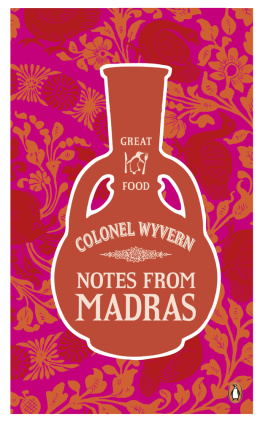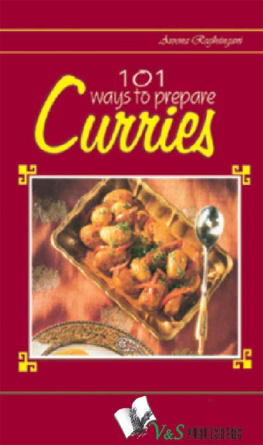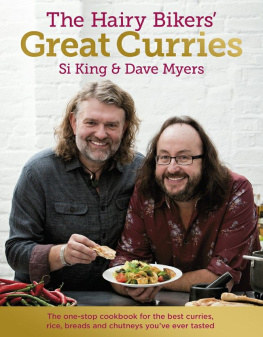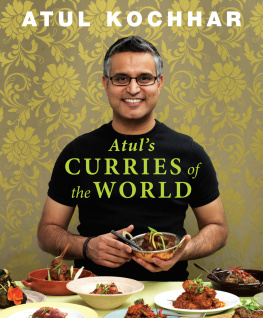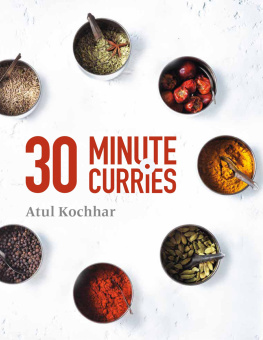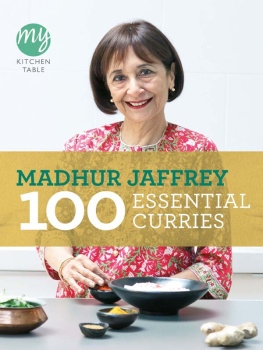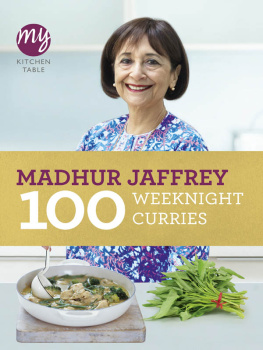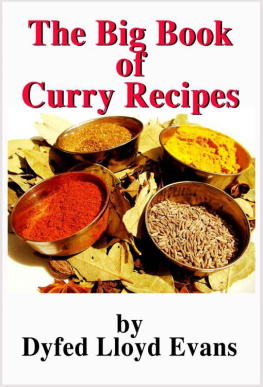Kenney-Herbert Arthur Robert - Notes from Madras
Here you can read online Kenney-Herbert Arthur Robert - Notes from Madras full text of the book (entire story) in english for free. Download pdf and epub, get meaning, cover and reviews about this ebook. City: London;New York, year: 2011, publisher: Penguin Books Ltd, genre: Home and family. Description of the work, (preface) as well as reviews are available. Best literature library LitArk.com created for fans of good reading and offers a wide selection of genres:
Romance novel
Science fiction
Adventure
Detective
Science
History
Home and family
Prose
Art
Politics
Computer
Non-fiction
Religion
Business
Children
Humor
Choose a favorite category and find really read worthwhile books. Enjoy immersion in the world of imagination, feel the emotions of the characters or learn something new for yourself, make an fascinating discovery.
- Book:Notes from Madras
- Author:
- Publisher:Penguin Books Ltd
- Genre:
- Year:2011
- City:London;New York
- Rating:3 / 5
- Favourites:Add to favourites
- Your mark:
- 60
- 1
- 2
- 3
- 4
- 5
Notes from Madras: summary, description and annotation
We offer to read an annotation, description, summary or preface (depends on what the author of the book "Notes from Madras" wrote himself). If you haven't found the necessary information about the book — write in the comments, we will try to find it.
Notes from Madras — read online for free the complete book (whole text) full work
Below is the text of the book, divided by pages. System saving the place of the last page read, allows you to conveniently read the book "Notes from Madras" online for free, without having to search again every time where you left off. Put a bookmark, and you can go to the page where you finished reading at any time.
Font size:
Interval:
Bookmark:

PENGUIN BOOKS
Published by the Penguin Group
Penguin Books Ltd, 80 Strand, London WC2R 0RL, England
Penguin Group (USA) Inc., 375 Hudson Street, New York, New York 10014, USA
Penguin Group (Canada), 90 Eglinton Avenue East, Suite 700, Toronto, Ontario, Canada M4P 2Y3
(a division of Pearson Penguin Canada Inc.)
Penguin Ireland, 25 St Stephens Green, Dublin 2, Ireland
(a division of Penguin Books Ltd)
Penguin Group (Australia), 250 Camberwell Road, Camberwell, Victoria 3124, Australia
(a division of Pearson Australia Group Pty Ltd)
Penguin Books India Pvt Ltd, 11 Community Centre, Panchsheel Park, New Delhi 110 017, India
Penguin Group (NZ), 67 Apollo Drive, Rosedale, Auckland 0632, New Zealand
(a division of Pearson New Zealand Ltd)
Penguin Books (South Africa) (Pty) Ltd, 24 Sturdee Avenue, Rosebank, Johannesburg 2196, South Africa
Penguin Books Ltd, Registered Offices: 80 Strand, London WC2R 0RL, England
www.penguin.com
Culinary Jottings for Madras first published 1878
This extract published in Penguin Books 2011
All rights reserved
Cover design based on a plate from Bombay, c. 1880. Glazed earthenware. (Photograph copyright Victoria & Albert Museum.) Picture research by Samantha Johnson. Lettering by Stephen Raw
Except in the United States of America, this book is sold subject to the condition that it shall not, by way of trade or otherwise, be lent, re-sold, hired out, or otherwise circulated without the publishers prior consent in any form of binding or cover other than that in which it is published and without a similar condition including this condition being imposed on the subsequent purchaser
ISBN: 978-0-14-196591-8
PENGUIN BOOKS GREAT FOOD
Notes from Madras
COLONEL ARTHUR ROBERT KENNEY-HERBERT (COLONEL WYVERN) greatly influenced Elizabeth David in her studies of spices in the English kitchen. Wyverns Culinary Jottings for Madras first appeared in 1878 and was written to instruct memsahibs in India on how to produce good Anglo-Indian food in the Victorian style with the ingredients available, and also to instruct mystified native cooks on the English appetite. He returned to Britain to set up a successful cookery school in London.
On visiting the vast collections of tinned provisions, sauces, &c., at some of the large establishments at the Presidency,I have often wondered how a lady, commencing house-keeping, is guided in selecting the things she requires for her store-room.A majority, no doubt, of the fair chtelaines of Madras, do their shopping at their boudoir writing tables, filling up lists at the dictation of the butler at their elbow;for few, I take it, very few care to go to the fountain head for what they want.
Now, a butlers ideas about stores are, on the whole, very mixed: he worships Europe articles and delights in filling theshelves of the store-room with rows of tins; of which some may perhaps be useful, but many need never be bought at all atMadras, and so remain for months untouched, lumbering the shelves of the cupboard. It has struck me, therefore, that a fewwords regarding the choosing of stores may be acceptable.
I have long come to the conclusion that the fewer accessories you use in the way of hermetically sealed provisions in thecooking of a dinner the better. In Madras we have all the materials for soup-making at hand, we have excellent fish, veryfair flesh and fowl, good wild fowl and game when in season, and vegetables from Bangalore and the Neilgherries in additionto the standard produce of the country. If, therefore, we concentrate our attention sufficiently upon what we can get from market, our demand on tinned food should be very small indeed.
Take now, for instance, a tin of the ordinary preserved mushrooms, those made you know of white leather, what is the useof them, what do they taste of? Yet people giving a dinner party frequently garnish one entre at least with them, and the Madras butler would be horrified if his mistress were to refuse him that pleasure. The stewedblack Leicestershire are the best preserved mushrooms to be had, but even between them and the fresh fungus, there is agreat gulf fixed.
A few years ago I met an officer of the Artillery, who, after having served in various parts of the world, had just been appointedto a command in this Presidency. Conversation happened to turn upon cookery, and the Colonel soon proved himself to be a manwho had for years studied the science con amore. He had had little or no experience of Indian life, and he expressed himself agreeably surprised, rather than otherwise,at the style of living to which he had been introduced. But, he said, preserve me from your dinners of ceremony. He hadarrived, he told me, quite unexpectedly a few evenings before, and had been at once invited to the Mess; the dinner, justthe ordinary daily one, was, he thought, excellent, and so it was the next day, and the day following, but on the fourthday he was formally invited to dine as a Mess guest, and that was a very different affair. Considerable expense had been incurred,he observed, on this occasion in tinned provisions, but with the worst possible result. There was a dish of preserved salmonhot, and sodden; the entres were spoilt by the introduction of terrible sausages, and mushrooms; and the tinned vegetables were ruined by being wronglytreated by the cook. There are few men, the Colonel went on, who have had more to do with preserved provisions than I have,but until I attended this big Indian dinner, I never saw such things actually regarded as delicacies, and put upon the tableto the exclusion of the good fresh food procurable in the market. This is the proper way of looking at this question. Therewill be times and places, when and where you will be obliged to fall back upon Messrs. Crosse and Blackwell, and be thankful.Until those evil days come upon you, however, do not anticipate your penance, but strive to make the food you can easily procure,palatable and good by scientific treatment.
I look upon tinned provisions in the hands of Ramasmy as the cloaks of carelessness, and slovenly cooking. He thinks thatthe tin will cover a multitude of sins, so takes comparatively little pains with the dish that it accompanies.
There are many ladies who, when giving out stores for a dinner party, have no hesitation in issuing tins to the value ofmany rupees, but if asked for extra cream, butter, eggs, and gravy-meat, the true essentials of cookery, begin to considerthemselves imposed upon. The poverty of our cookery in India results almost wholly from our habit of ignoring these things,the very backbone, as it were, of the cooks art. If an English cook, surrounded with the best market supplies in the world,be helpless without her stock, her kitchen butter, and her cream and eggs, how much more should Ramasmy be pitied if he be refused those necessaries, for his materials stand in far greater need of assistance.
In the matter of firewood and charcoal too, I am aware that there is often a difference of opinion between the cook and hismistress, and I am inclined to think that Ramasmy is generally in the wrong. Still, we should be careful lest we limit hissupply of fuel too closely especially on a dinner party day. I once was a guest at a house where the dinner was served perfectlyas far as the joint, when a sudden collapse took place; the game and dressed vegetable were stone-cold. The excuse the nextday was, charcoal all done finish, and Missis only got godown key in the pocket.
Font size:
Interval:
Bookmark:
Similar books «Notes from Madras»
Look at similar books to Notes from Madras. We have selected literature similar in name and meaning in the hope of providing readers with more options to find new, interesting, not yet read works.
Discussion, reviews of the book Notes from Madras and just readers' own opinions. Leave your comments, write what you think about the work, its meaning or the main characters. Specify what exactly you liked and what you didn't like, and why you think so.

